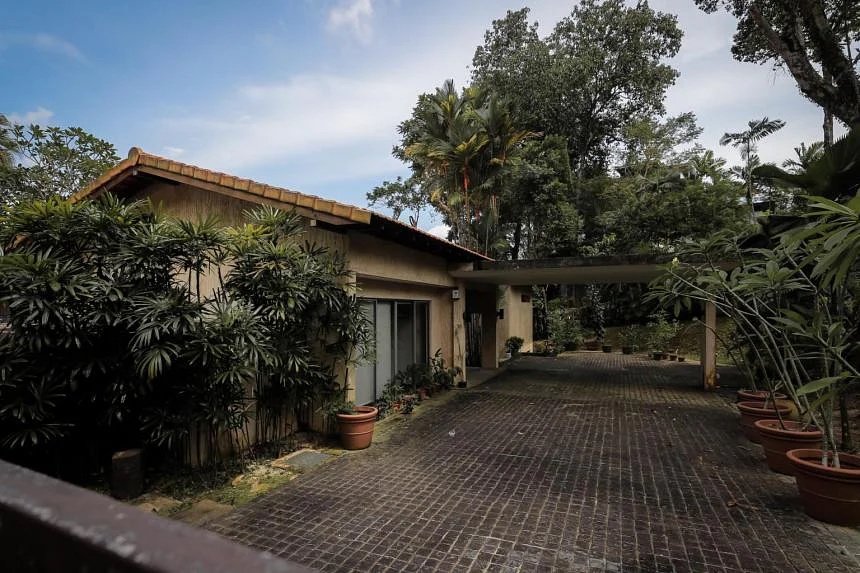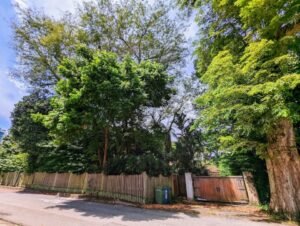Dr Lee Wei Ling, the daughter of the late founding prime minister Lee Kuan Yew, has sold her property in the Cluny Hill good class bungalow (GCB) area to Sichuan hot pot chain Haidilao International co-founder Shi Yonghong for $50 million, The Straits Times has learnt.
According to documents obtained by ST, the legal transfer of ownership of the freehold GCB in Cluny Hill to Mr Shi, also known as Sean Shi, took place on Sept 6.
The previous owner was Kwa Geok Choo Pte Ltd, now known as Cluny Lodge Pte Ltd. Kwa Geok Choo is Dr Lee’s late mother.
According to Accounting and Corporate Regulatory Authority (Acra) filings seen by ST, Dr Lee – the sister of Prime Minister Lee Hsien Loong – is listed as its sole shareholder. Its directors include her nephew Li Huanwu, the second son of Mr Lee Hsien Yang and his wife Lee Suet Fern.
Mr Shi is also chairman of Haidilao’s seasonings and sauce arm, Yihai International Holding. According to Acra filings, Mr Shi is serving as a director of at least 10 Singapore-incorporated firms, including Yihai (Singapore) Food, Fuhai (Singapore) Food, Haidilao International Food Services, and Shuhai (Singapore) Supply Chain Management.
At $50 million, the price works out to $2,740 per sq ft on the land area of 18,255 sq ft. On site is an old bungalow.
Market sources say a property in the Cluny Hill GCB area, on a redevelopment land basis, could fetch between $3,000 and $4,000 psf, depending on the condition of the property, land size and whether the land can be subdivided.
“But the $2,740 psf price reflects that the buyer will need to invest in redevelopment, which can cost $10 million or more,” Mr Karamjit Singh, chief executive of property consultancy Delasa said.
“That would bring the value of the rebuilt property to at least $60 million, which will translate to between $3,200 and $3,300 psf, which is more in line with the market,” he added.
Mr Samuel Eyo, managing director of Lighthouse Property Consultants, said the last caveated GCB transaction in Cluny Hill was at $63.7 million, in April 2021. Local technopreneur Tommy Ong had bought a freehold bungalow under construction on a 14,843 sq ft plot in Cluny Hill for $4,291 psf, the highest on a new-bungalow basis in a GCB area.
Another factor behind the $2,740 psf price may be the property’s location “below road level, meaning the land slopes downwards as you enter”, Mr Eyo said.
Most buyers tend to prefer property on elevated ground, he added.
List Sotheby’s International Realty’s analysis of data from the Urban Redevelopment Authority’s Realis platform showed that there were 37 deals in GCB areas worth $939.97 million from January to early September 2022.
In the same period last year, there were 73 bungalow deals totalling $2.14 billion. For the whole of 2021, there were 90 GCB deals totalling $2.57 billion.
“The drop in transactions could be due to a widening gap between sellers’ and buyers’ price expectations, and fewer bungalows put up for sale,” List Sotheby’s International Realty research director Han Huan Mei said.
“Market sentiment is more cautious in view of the prolonged Ukraine-Russia war, volatile energy and food prices, steeper interest rates and the risk of a recession,” she added.
Mr Shi’s Cluny Hill GCB is located in the neighbourhood of Haidilao chairman and co-founder Zhang Yong’s GCB in Gallop Road. Both properties are within walking distance of the Singapore Botanic Gardens.
The family of Mr Zhang, formerly Singapore’s richest billionaire, bought a 21,649 sq ft GCB in Gallop Road at $42 million, or $1,940 psf, which analysts say is the highest price psf paid for a GCB in that area in December 2020.
Mr Zhang Yong, a naturalised Singapore citizen, and his wife, Shu Ping, co-founder and director of Haidilao, ranked sixth on Forbes’ Singapore’s Richest list this year, with a combined net worth of US$7.7 billion (S$10.8 billion).
Mr Shi and his family, who ranked 87th in Forbes’ China’s Richest list last year, has a net worth of US$4.1 billion.
According to Forbes, Mr Shi, who owns his stake in Haidilao with his wife Li Haiyan, also has a stake in Yihai International, which was spun off from Haidilao. He sits on the board of both companies.
Haidilao, which went public in Hong Kong in September 2018, plans to spin off its overseas business and list it in Hong Kong, Bloomberg reported in July this year.
In an exchange filing, the Beijing-based company said a spin-off of Super Hi International Holding would position the unit and the parent for growth.
The company opened its first overseas store in Clarke Quay in 2012.
As at the end of 2021, Haidilao ran 1,329 stores in mainland China and 114 stores in locations including Hong Kong, Macau, South Korea, Japan, Canada and Britain.
Its annual report showed that the overseas operations generated about 2.95 billion yuan (S$593 million) in revenue last year, equivalent to about 7 per cent of the company’s total, Bloomberg reported.
The hotpot chain closed 276 outlets in 2021, in part due to China’s “Covid-zero” approach that led to disruptive lockdowns. With rising costs in staffing and raw materials, the company’s profit growth may stay choppy for the rest of 2022, according to Bloomberg.
source : The Straits Times




